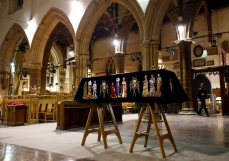I find myself strangely conflicted about Richard III. I was not part of the throng which lined the route his coffin took to Leicester Cathedral, and I'm not going to queue for hours to see it before he's finally reburied.
But I can understand the appeal of the spectacle; I can do all that romance-of-the-past stuff. And the sheer improbability of the whole king-in-the-car-park story: that we should actually find the body of the last Plantagenet, who, thanks to Shakespeare, is known wherever English is read, makes this more than a passing curiosity.
On the other hand, the Wars of the Roses were one of the two most devastating series of conflicts in our history. And unlike the Civil War, they were fought not out of high principle but out of greed and ambition. Aficionados of Game of Thrones will recognise their world very well, as George R R Martin used it as a pattern for his extraordinary epic. The battle of Towton, fought in a snowstorm in 1461, was the bloodiest ever fought on English soil, costing the lives of 28,000 men, who died to decide – temporarily – the ultimately trivial question of who should be king.
And what of Richard himself? A reasonably popular figure in his Northern heartland, in his two-year reign he looked as though he might make a decent fist of it, with one or two important legal reforms. He had some principles.
Those were tough times. The saintly but hopeless Henry VI is the best imaginable argument against a heredity monarchy: you had to be ruthless to govern, and he was clearly unfit. Edward V was too young to exercise power effectively, and so arguably rule by Richard was in the country's best interests.
But this was a child-killer. And not only did he almost certainly do away with the Princes in the Tower – his nephews, the sons of his brother Edward IV – as well as various other political rivals, but he may even have killed the old and frail Henry as well (admittedly, the evidence for this is weak to non-existent). Yet the route of his coffin was lined eight deep, Leicester Cathedral has been remodelled at vast expense to accommodate his bones, and Britain has gone Richard mad.
Giving such honour to a murderer and a traitor is, to say the least, odd. Do we really care so little about his crimes? Evidently. But though the crimes are ancient history, the reason why is depressingly contemporary.
The truth is that kings are romantic. They're even a bit romantic today. And in the soft light of an imagined mediaeval past, they are irresistible. There's something of Edwin Arlington Robinson's famous character Miniver Cheevy in all of us: "Miniver loved the days of old,/ When knights were bold and steeds were prancing;/ The vision of a warrior bold/ Would set him dancing." As the late Terry Pratchett put it, life was a lot more colourful then, especially if you liked the colour of blood.
Pratchett was very sound on kings in general. In one of his City Watch books, a character says: "Royalty pollutes people's minds, boy. Honest men start bowing and bobbing just because someone's granddad was a bigger murdering b*****d than theirs was."
The glamour that's cast over dreadful deeds because of who did them is a terrible temptation. It makes us skate over their sins because of their virtues, which may be real or imaginary. Either way, their crimes aren't as serious because of who they are.
And it's not just royals, either. Nowadays we are more inclined to romanticise other people, because we like them or admire them, or because they entertain us. I make no direct comparison with Richard's crimes, but Stephen Fry's confessions that he snorted a mountain of coke – directly contributing, don't forget, to an 'industry' that has inflicted death, destruction and ruin on populations from Colombia to Afghanistan – attracted no more than a sort of bemused wonderment. Jeremy Clarkson allegedly abused a junior colleague over a trivial administrative failure – if it was even that – and a million people signed a petition in support of him when an estate agent, say, would have been fired on the spot.
These entertainers are of no significance other than to point out a moral. But what about the others who sway our judgment because of their supposed heroism, or because they're on the "right" side, whose crimes we choose not to see because they may be villains, but they're our villains? The world has seen far too much of this in recent years, and we will live with the consequences for generations. Pakistan did devilish deals with the Taliban, thinking it could ride the tiger. America decided that when it came to human rights, it was "Do as I say, not as I do," and Guantamamo is a standing rebuke to its claim to moral uprightness. Britain is facing up to claims that accusations of sex offences by high-profile establishment figures were ignored or suppressed by powerful people. After all, these are people who served their country.
Now, a certain amount of realpolitik is essential when it comes to government. "Be not righteous overmuch," says the writer of Ecclesiastes in the Bible's nearest equivalent to Machiavelli's The Prince. And the idea of Britain actually being governed by the many professional occupiers of the moral high ground is absolutely terrifying. But let's not be seduced by the glamour of power into approving every way in which it's used. A murderer is still a murderer, royal or not.
By all means rebury Richard decently. If there has to be a bit of a show, fair enough. But don't pretend he was a good man. "History to the defeated/ May say Alas but cannot help or pardon," wrote Auden. Too bad for the Princes in the Tower. "To the living we owe respect, but to the dead we owe only the truth," wrote Voltaire. Too bad for Richard.
Mark Woods is a contributing editor at Christian Today.
















